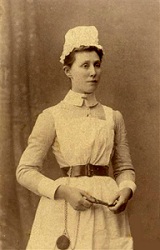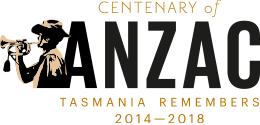Matron Major Elizabeth Orr RRC
Tasmanian
nurse Elizabeth Orr was dedicated to nursing and serving the military, and enlisted
in the Boer War  and World War One.
and World War One.
Elizabeth Orr was born on 8 September 1860 in Tasmania’s Hamilton district. She trained as a nurse at the Hobart General Hospital in 1881, and worked as a country nurse, often riding long distances on horseback to care for patients.
Tasmania did not send nurses to Boer War (1899-1902), but this did not deter Sister Orr, who was nearly 40 years of age when the Boer War broke out. Through sheer determination and at her own expense, she travelled to South Africa in January 1900 and joined the Queen Alexandra Imperial Military Nursing Reserve where she was placed in charge of war hospitals. She was granted the Queens South African Medal for her service.
After the Boer War, Sister Orr remained in South Africa for 12 years and was matron of various hospitals. She eventually returned to Australia to open a private hospital at Maitland, in New South Wales, which she sold at the outbreak of World War One.
Despite being 54-years-old when war was declared in 1914, Sister Orr left for England and joined the Queen Alexandra Military Nursing Reserve.
In late 1914 she served with the 21st British General to Egypt where for 18 months she was Matron of Transports and Hospital Ships in the Mediterranean, Gallipoli and Salonika areas. Her responsibilities included the troop ship “Alaunia” and the hospital ships, “Morea” and “Nevassa”.
Matron Orr served through the Palestine campaign. She was in charge of a 2,500 tent hospital at Deir el Belah. The work was strenuous and difficult; food was often inadequate; and the medical staff and troops battled war wounds and rampant diseases such as diphtheria, dysentery, measles and malaria. As a horse lover, Matron Orr knew how the Australians loved their mounts and wept with them over the plight of the poor creatures that were killed and dreadfully wounded during the campaign.
Matron Orr was mentioned in dispatches twice. The Secretary of State War, Winston Churchill, wrote to her saying:
“I have it in command from the King to record His Majesty’s high appreciation of services rendered”.
Matron Orr’s health deteriorated in the desert due to malaria and she was invalided to England.
After recuperating, Matron Orr returned to duty at the Royal Herbert Military Hospital at Woolwich to care for returned soldiers.
In 1920, Matron Orr returned to Tasmania, where she was appointed matron of the Vaucluse Infectious Diseases Hospital; an inaugural member of the Nurses’ Club of Hobart from 1922; and the president and later patroness of the Returned Army Sisters’ Association.
Matron Orr attended the first ANZAC Memorial Service in Cairo in April 1916, just as she would be at all ANZAC Day services thereafter until her death on 30 April 1945. She was known to remark that she had “seven medals and a good chest to put them on”.
A plaque in memory of Elizabeth Orr was unveiled at Hobart’s Queen’s Domain by Hobart City Council Alderman Helen Burnet and military historian, Reg Watson on the annual Boer War Commemorative Day in 2012.
- Reg Watson is a member of the Centenary of ANZAC Steering Committee, who has researched Elizabeth Orr, cited her records and met with her relatives.

